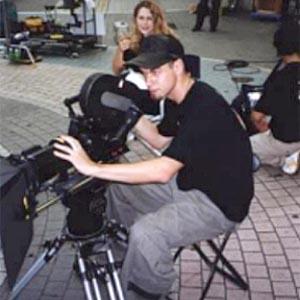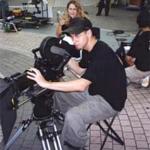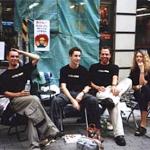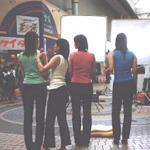Hair Color Eleven
"Akushun!" The director growled a tenth consecutive time. The small cast of four foreigners and three Japanese snapped into their new roles simulating a movie crew busy at a film shoot. I concentrated on my less-than-prestigious duty as a lighting man perched high upon a couple of old rickety crates. There was welcome relief in the thought that no one would scrutinize such an insignificant role, destined to be relegated to a corner of the screen.
I had begun the day's shooting criticized for acting too unnatural, once even staring directly into the camera and committing various other cardinal sins of film production. My efforts shifted after some coaxing from the crew, and I forced myself into a role as an enthusiastic supporting actor. The director had asked me specifically to wear the face of a concerted blue-collar worker. Problem was that my acting resume didn't exist and my blue-collar experience wasn't much more helpful. As for my idea of a determined look, it more closely resembled someone straining on the toilet. As the camera swept across my field of view I carefully tilted my spotlight, twisting my face in faux concentration.
"Cut! Da-me!" Dame translated to English means bad, wrong, useless or impossible, none of which could be considered particularly flattering. The fact that he was shouting it in my direction suggested that added to my responsibility for the previous ten takes was the failure of an eleventh. Indeed this was to be my first (and fast approaching my last) television commercial. I barely understood a word he was saying to me, and not surprisingly it didn't make him any more sympathetic either.
"Amerikan komodee desu ka?" Is this an American comedy? The director cried out in disbelief, sweat pouring down either temple. I cracked a half-smile, unintentionally, more as a result of his sudden razor-sharp wit than out of frustration with a situation I had myself created.
My British friend Owen, a fellow English teacher, had called me the day before, "Nolan, you wanna be a TV star?" We've been filmed here a half dozen times before, at cultural events and teaching seminars, and I assumed this was yet another offer from a local public television station. "Nah, this is a commercial for a drug store chain called Drug Eleven and it'll be shown all throughout Kyushu. Rumour is that we'll be paid too." Clearly this was a chance for our very own fifteen minutes of fame. "The catch is that we're starting tomorrow. Can you do it?" Many foreigners had achieved pseudo-stardom performing in bit television parts all across Japan. I knew that if I didn't jump on it somebody else would. Owen, lacking any real experience himself, quickly called a third friend, Matt, affectionately known as Foo, and a fourth cast member was added, a tall blonde Canadian woman from the neighbouring prefecture. All we knew about Jessica, our female counterpart, was that she was slim, attractive, and engaged to a man who had himself done some work in Japanese ads.
The next morning Owen and I drove into Kagoshima City, close-shaven and polished, confidant our shot at the big time had finally arrived. The low-lying skyline of this deep-southern city contained a hint of fine ash from the hovering volcano of Mount Sakurajima. Sakurajima's last violent eruption consumed hundreds of homes in 1914 and the ensuing lava flowed so thick and strong, in great rivers of fire, that this once peaceful island was forever linked with the mainland across the open mouth of the bay. It remains one of the world's most active volcanoes and yet half a million people still willingly choose to live under its impending shadow.
We met Foo laying flat on his back on a city bench, wearing filthy shoes, tattered pants, and the remains of what was once a baby blue, cancer fundraising shirt clinging to his exhausted body. What's more he had recently sheared his handsome hair and was now sporting a menacing goatee. Owen and I glanced at each other out of concern, since we were filming within the hour. He struggled to speak, "I was still drinking three hours ago, in Tokyo." The irony that it was nearing midday and that Tokyo was a thousand kilometers away was not lost on us.
Jessica, six feet of indefatigable energy and tight curls, whirled in to meet us in Tenmonkan, the city's busy shopping square, immediately followed by a worried Japanese woman and a frantic looking man who could best be described as having that director look. "There have been some problems with the lighting," the public relations woman informed us. "But while we're waiting we'd like you to change into these shirts." We were handed black t-shirts with the yellow logo, "Hair Color Eleven," ironed on the front in haste, probably only minutes before, as they were already beginning to peel.
In the center of the ash-covered square, filled with midday shoppers lugging designer handbags and flawless, wrapped parcels, there was a serious looking movie set in the midst of panicked construction with blinding lights marking all four corners. Searching around but not finding a trailer for the actors, we asked exactly where we were supposed to change. A glum assistant pointed to a small alley next to a popular bank, only partially obscured by a telephone pole. "Over there?" we grimaced in disbelief, our first realisation that this was not the big budget production that we had first envisioned.
"You've got to be kidding," grumbled Jessica after which she was whisked off to a nearby van for some privacy, leaving us boys to the elements.
Jessica's a card-carrying member of the local ex-pat ghetto. Inevitably, whenever there are large numbers of foreign teachers in an Asian city, there will also be an accompanying district to where they flock together on a regular basis. Membership here follows strict criteria: cling only to English-speaking friends, hold an insatiable appetite for Western fast food, harbour a disinterest in all things Japanese, and above all, maintain a firm belief that to live anywhere else in the world other than Japan would be a blessing. Exhibit A in Jessica's case was her constant reference to Berlitz's "Easy Japanese" phrasebook, even after an entire year in Japan.
Besides coming to terms with culture shock, foreigners get more than their fair share of constant attention in Japan. When performed by a foreigner, any attempt to use chopsticks, string three Japanese words together, ride a bicycle or even buy toilet paper at the local supermarket is grounds for excitement combined with great fits of laughter. In many ways, Japan is still a relatively closed society, a place where twenty years ago you'd be hard-pressed to find a decent coffee or hamburger, where five years ago there was almost no internet service available, and where today the average university graduate still struggles to introduce himself in English.
Foo turned away from the dozens of curious onlookers and, while wrestling with his new shirt during Kagoshima City's busy lunch hour, he mumbled to himself, "There's no time like today."
A man nearing fifty years of age walked towards us sporting a smart business suit and an engaging, magnetic smile. With confidence, in lightly accented English he offered, "My name is Ryuiji Takamori. You must be here for the CM." CM is the Japanese abbreviation for a television commercial. When faced with an English word that is difficult to pronounce, a typical Japanese response is to hack it down to size, often leaving twisted results. Following in this line of reasoning, McDonald's Japan has often advertised, on towering billboards, a sale price for their B.M. combo.
Takamori-san was the owner of the Drug Eleven chain, one of the biggest of its kind in Japan. He went on to explain that the company was expanding into high-end hair products, offering free color treatment, thus requiring a whole new angle for their advertising. He did his best to accommodate us and make us feel welcome, even clearing a few cluttered director's chairs and inviting us to help ourselves to some chilled tea and bentos (boxed lunches).
Just then an impish man, not five feet high with sprouting artistic hair and little care for fashion, entered the scene. He had to be our director. We soon found out he was, and Tsuyoshi-san at once was busy half-listening to our introductions while rudely examining the most particular details of our faces from only a foot away.
"Ok, ok," he brushed off our formal greetings as only a Japanese professional can before asking his supporting entourage which one of us looked the scariest. It was ultimately down to Foo and I and quite frankly, I was insulted at even been considered for this reject-competition, especially given Foo's current state.
After almost three minutes of deliberation and debate, Foo was given the role of the intimidating cameraman. Little did we know he had now secured the most significant part of the day's shooting. With Jessica a lock for the part of the attractive director, Owen and I were left to challenge for what was surely one of the few speaking lines available. Not outwardly competitive, Owen and I share that silent competitive streak amongst male peers that stops just short of bloodshed. Now we found ourselves battling it out like a couple of drama queens repeating line after line, the altogether dull words, "Let's check it out." Owen relied heavily on his admittedly charming English accent, no doubt honed with years spent charming the pants off of university girls during his upscale British education. I, on the other hand, chose the more predictable part of the fool, alternating between different accents and tones, drawing from a vast arsenal of bad comedic impressions. They were all there: Chris Farley, Eddie Murphy, Adam Sandler. The director hadn't anticipated this change in tactics and looked to be actually considering me, or maybe it was just the sudden desperation in my eyes. Regardless, he had come to a decision. Owen was chosen with a swift finger towards his chest before Tsuyoshi-san turned quickly to walk away.
"Wait a minute, I haven't got a part yet," I implored, rather pathetically.
"Don't worry," he replied, with hardly a glance. "You are now the lighting man." Confused and slightly dejected I turned to my friends for clarification but they were already lost in their new-found glory.
After finishing our acceptable bento lunches, and washing them down with tasty green tea, we were refreshed and ready to start taping. Three attractive, but not stunning, Japanese women in brightly coloured, low-necked dresses now appeared from across the plaza, shifting their slight weight from leg to leg while balancing uncomfortably on vomit-green high heels.
Our models had arrived and they were even less impressed than we were with the working conditions. I offered the cutest one my chair, but after a quick, silent debate, she rebuffed my suggestion with an Oscar-worthy cold shoulder, made all the more complete when accompanied by a fully repulsed turn of the cheek.
Now it warrants mentioning how four incompetent acting virgins like us got thrown into a commercial shoot in the first place, hired the day before no less. The company had apparently paid a considerable sum for three experienced models to fly in from Los Angeles. The events of September 11th erased all of those plans and three Japanese women were recruited locally to stand in for the absentee Americans. This left the whole scene free of foreigners. Knowing that even the most unattractive western face will at the very least garner some curiosity, the company felt a foreign presence was critical to the shoot. A frantic, last minute search uncovered four amateurs now standing shoulder-to-shoulder with a very experienced crew obviously short on time, money, and most alarmingly, patience. In addition, they hoped to wrap up the all of the video and audio in one day, which sounded ambitious even to our ignorant ears.
After filming our initial scene in a grand total of twenty painstaking takes, there were three hours of monotonous waiting while the crew adjusted equipment, reviewed video, and discussed the afternoon?s plans. The uncomfortable silence amongst the four of us spoke volumes. Without an official contract, and suffering the full effects of a dull Saturday afternoon, we knew it was time to talk cash. The PR woman was nowhere to be found so Owen reluctantly edged over towards Takamori-san, the money behind the operation. They awkwardly talked shop in broken Japanese. Takamori-san was red-faced and more than a little embarrassed to be mentioning money in the middle of a shopping plaza, an act that no self-respecting Japanese would ever consider under normal circumstances. In spite of this, or perhaps because of it, Owen managed to negotiate a payday amounting to almost two hundred dollars in cold hard yen. Takamori-san had even thrown in twenty dollars in restaurant coupons to ice the deal, enough, we decided, to take away the sting of a sacrificed weekend.
Foo, having recovered his blue-eyed charm, swooped in on the Japanese models, and using his fine-tuned dating Japanese, made initial contact with the women and learned that they too were inexperienced. Two were students and the other was a nurse. His playful chat was interrupted though, as we were hurried in to wrap up another scene. It was to be the last filming of the day and while most were relieved, I was still steaming from my earlier chewing-out session.
Strangers came in droves to watch the three models encircled by a ring of rag-tag foreigners pretending to film them. Foo was on camera, sporting a mysteriously obtained brown baseball cap, with Owen looking rather prestigious in half crouch, Jessica seated comfortably in her director's chair, and me struggling to balance atop a wobbly stack of old boxes while squinting under the intense 1000 watt lights. We were destined from the very beginning to need more than just one take.
The flabbergasted director decided, after five more ruined shots, that I would be demoted from my dubious role in lighting and would now be replacing the key grip, the sweaty grunt who pushed the camera cart along the fixed track. This was insult to injury but I was secretly relieved to be out from under the spotlight. Staring squarely at Foo's rear end, I was still on camera but in the shadows, and now playing an actual technical role. End of the abuse, I concluded.
"Cut! No, no, no! Da-me!" It seemed I had sped up unconsciously in my nervous haste. He needed an even pace across the foreground. As if to shame me into compliance, a ridiculous wide-brimmed straw hat was placed on my head further obscuring my real identity. I wallowed in anonymity, but I kept my complaints to myself, determined to finish this hellish humiliation.
"Akushun!" The director shouted as I moved the cart, concentrating simultaneously on my pace, hand position, head tilt and the direction of my attention. The scene played in slow motion from here on in, and the hundreds of spectators now crowded behind us watched breathlessly as if they had followed all of the afternoon's peculiar drama. Each foot moved in perfect precision, one after another, and my head shifted at just the correct moment, when the unthinkable happened- the leg of a lighting stand, unbeknownst to me, had been placed in front of my path in between takes, and just as we would have finished that coveted perfect scene, my right shin slammed full force into it, knocking over the light and making a noticeable crash in the process. I let out a resounding flurry of colourful four-lettered words, much to everyone's great amusement, apart from my own. The crowd roared in delight, evidence that laughing at the expense of blundering foreigners is a universal pleasure. As it happened our director looked ready to explode, nostrils flared, eyes bulging, and genuine grief in his eyes. Scared of the probable repercussions, we hurriedly reassembled for what amounted to a quick and painless final take.
After wrapping up audio and video for the day, and when we finally informed Tsuyoshi-san that I wouldn't be available for the following day of shooting, he looked relieved, cracked his first smile of the afternoon and sent me away for my welcome return to reality.
 ThingsAsian
ThingsAsian



















